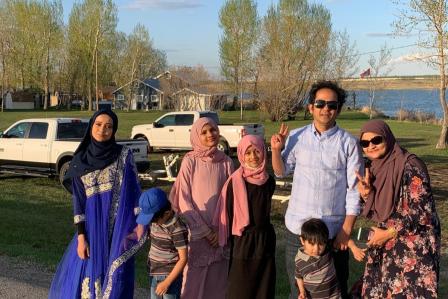Malaysia: Rohingya refugees are here, they are living under the shadows
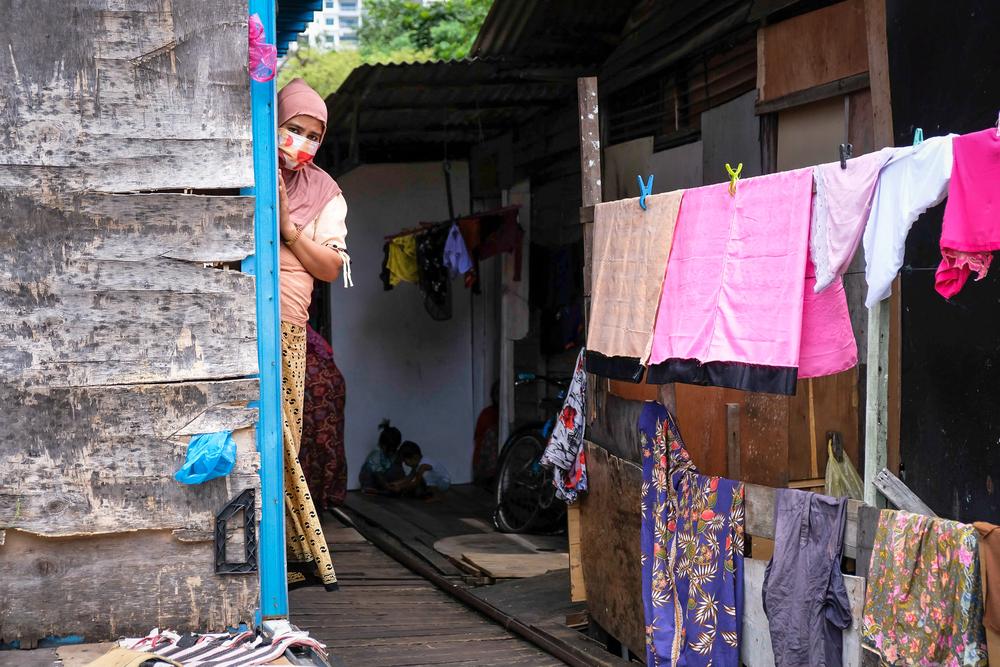
Anuar Begum Abdul Malik, 42, is looking out of the door of her home at Georgetown, Penang. Anuar and her family are from a village in Rakhine state, Myanmar. They fled to Malaysia in 2015 and originally settled in Kelantan state, Malaysia. © Kit Chan
Rohingya people have been fleeing to Malaysia over the past 30 years with hopes and dreams of a new life in safety. However, most of them who make the journey end up being marginalized and without legal status. Unable to work legally, they often disappear into Malaysia’s urban black-market economy, where they are vulnerable to exploitation, debt bondage, and hazardous jobs. Walking down the street or even seeking medical care can result in refugees being arrested or sent to detention centres.
Denied citizenship in Myanmar, the Rohingya refugees fled to various countries including Malaysia. There are more than 100,000 Rohingyas here. However, the Rohingya in Malaysia have been challenged by the Malaysian legal system and the fact that Malaysia is not a signatory to the 1951 Convention Relating to the Status of Refugees and its 1967 Protocol.
So far, Malaysia does not have any formal legislative or regulatory mechanism to protect asylum-seekers and refugees. Due to this, the refugees in Malaysia lacking legal status which puts them at risk of repression and abuse. Many Rohingya in Malaysia have been subjected to harassment, extortion and imprisonment.
What is lifelike for the Rohingya who fled to Malaysia? What is daily life like in a decades-long humanitarian crisis?
Remember the Rohingya. Remember their plight.
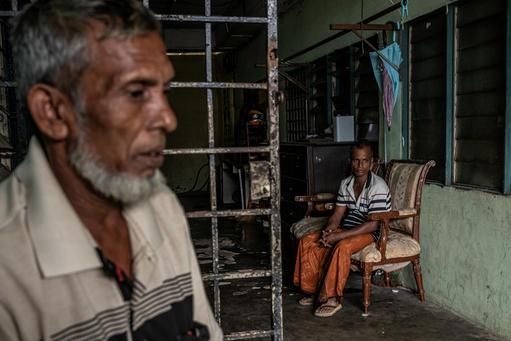
A Rohingya family in the dilapidated building where they live, in Puchong district near Kuala Lumpur. April 26, 2019, © Arnaud Finistre
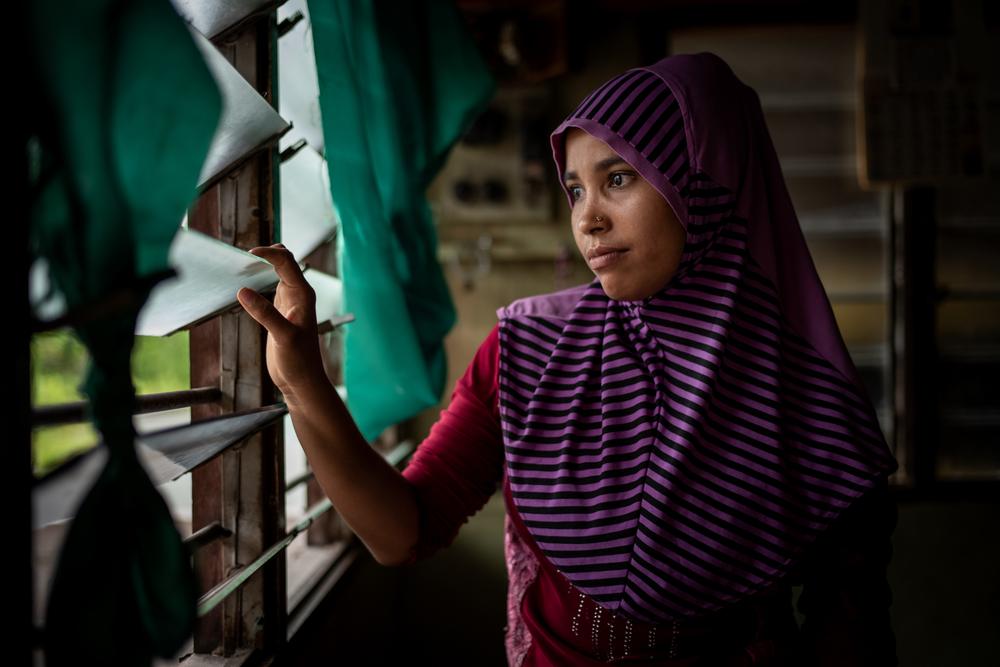
Rashida, 22 years old, was born in Rakhine state, Myanmar. She fled alone in 2012 when she was 15 years old and sought refuge in Bangladesh. From there, she travelled to Thailand, which entailed an eight-day trip on a boat with around 500 passengers on board. She reached the Malaysia border by foot with the assistance of smugglers, then spent three and a half months in a Penang detention centre. Since arriving, she is married a Malaysian-born Rohingya who works for a cleaning company, Penang. April 17, 2019, © Arnaud Finistre
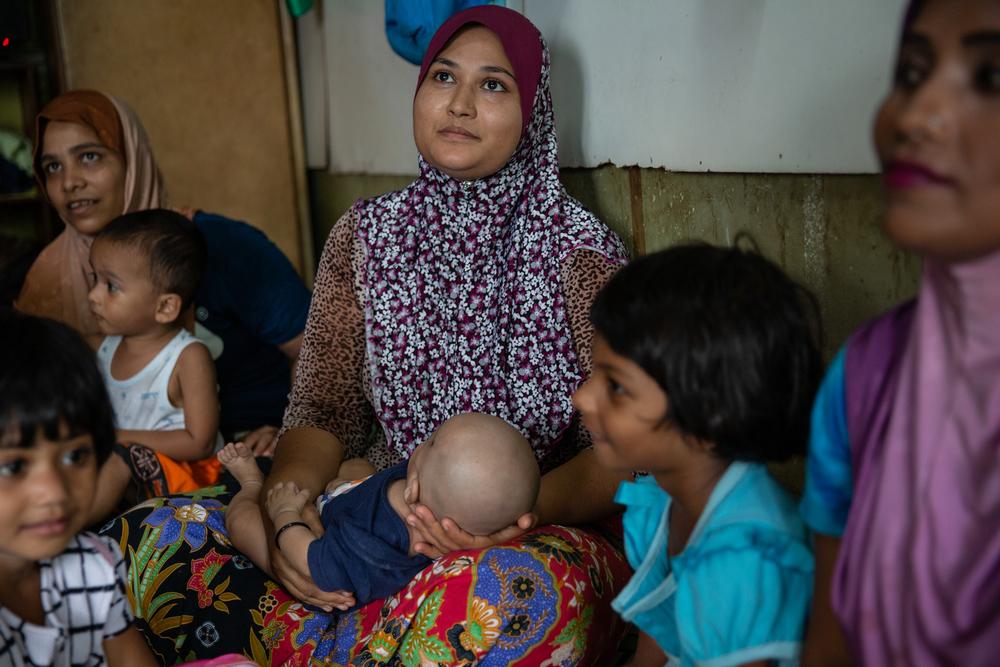
While their male relatives are at work, Rohingya women and their children come together to pass the time. Penang, April 17, 2019, © Arnaud Finistre
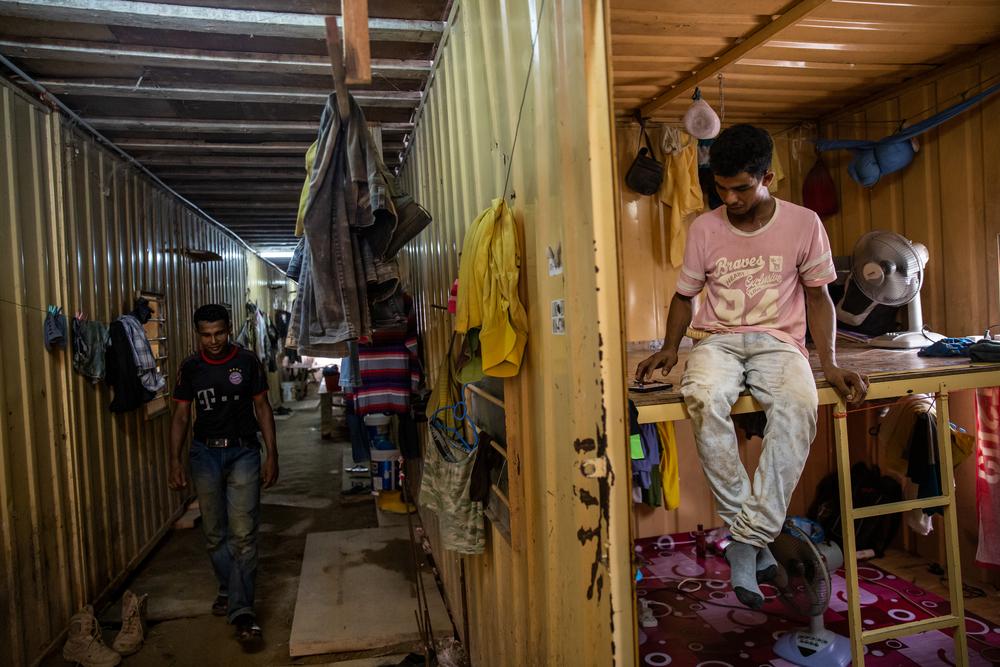
Nur, 27 years old (right), shares this container with seven other Rohingya workers employed on a massive construction site. Muhammad (left) shares the container with Nur. They are among many workers building a condominium with several hundred high-end units in the Bayan Lepas district of Penang, Malaysia. Rohingya often find informal employment on such construction sites, undertaking the most menial, undesirable, or dangerous jobs. Like many other workers, they also live on site, sharing extremely basic accommodation. April 22, 2019, © Arnaud Finistre
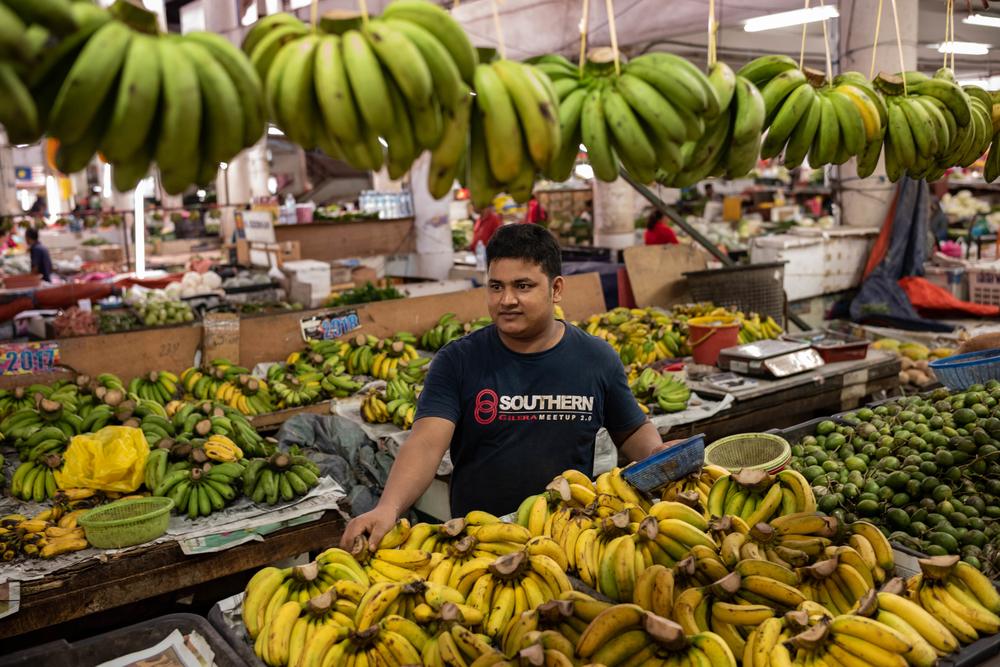
Sadek, 26 years old, arrived from Myanmar in 2012 and has been selling fruit at the Klang market for almost three years. His boss is Rohingya, like him. He works from 3am to midday six days a week. Klang, Kuala Lumpur. April 27, 2019, © Arnaud Finistre
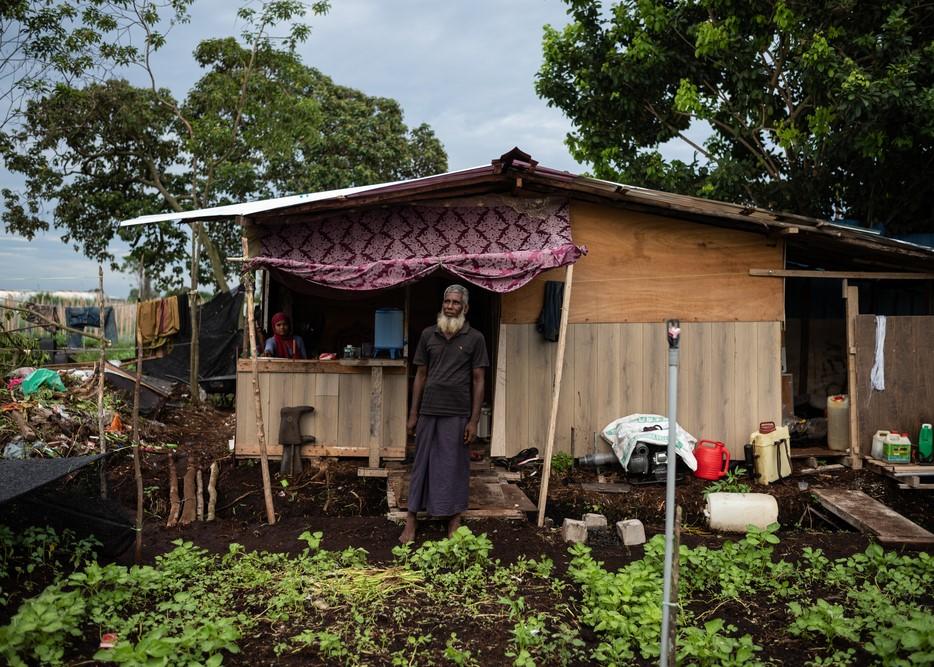
Mohamed T., 56 years old, stands in front of the small shelter he shares with his daughter, her husband, and their children. He works more than 12 hours a day, seven days a week in small-scale agriculture near Banding. He fled Myanmar in 2012 after his family was persecuted. Tayab did not previously work in agriculture but says he had no choice: “It’s still better than nothing,” he says. What bothers him the most is regular altercations with the Indian workers, who are very rough with the Rohingya workers. Some of the Rohingya workers have had their salaries stolen after being threatened. Banding, Kuala Lumpur. April 27, 2019, © Arnaud Finistre
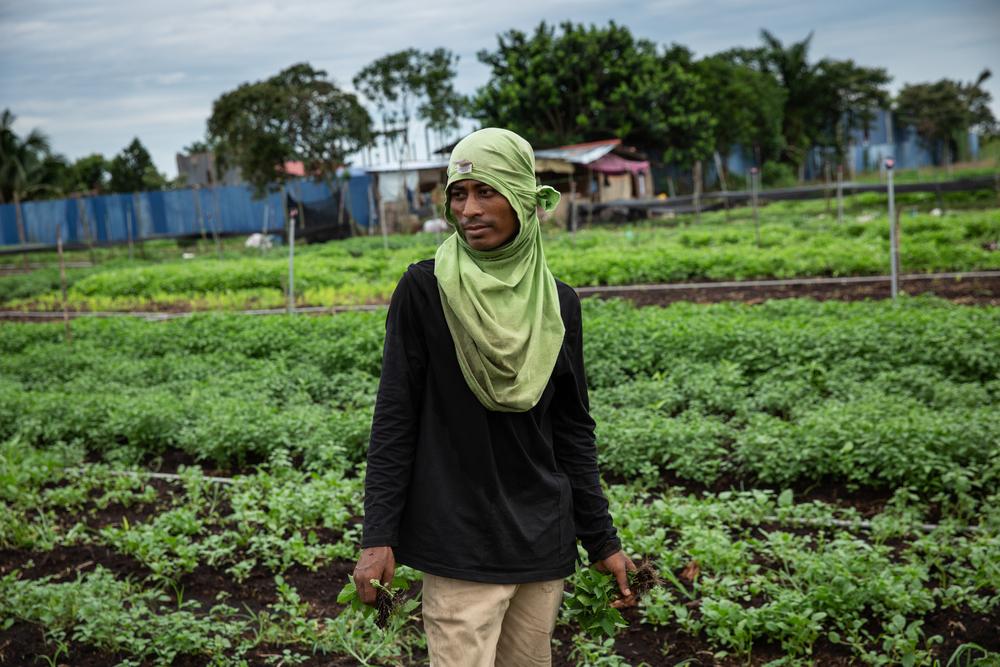
Portrait of a Rohingya farm worker in the middle of a small farm in Banding, Kuala Lumpur. One of the informal job opportunities available to the Rohingya in Malaysia is work on small-scale farms. In Banding, a city 30 minutes from Kuala Lumpur, over 150 Rohingya work seven days a week as farm hands. House on-site by their Malaysian employers in rudimentary shelters without running water, the workers are considered a cheap and docile labour force and they have few rights. They often work 12-hour days. If they fall ill or are injured, they do not get any health insurance or salary. The Rohingya are often poorly accepted by other communities, so tensions are rife with other migrant groups. April 27, 2019, © Arnaud Finistre
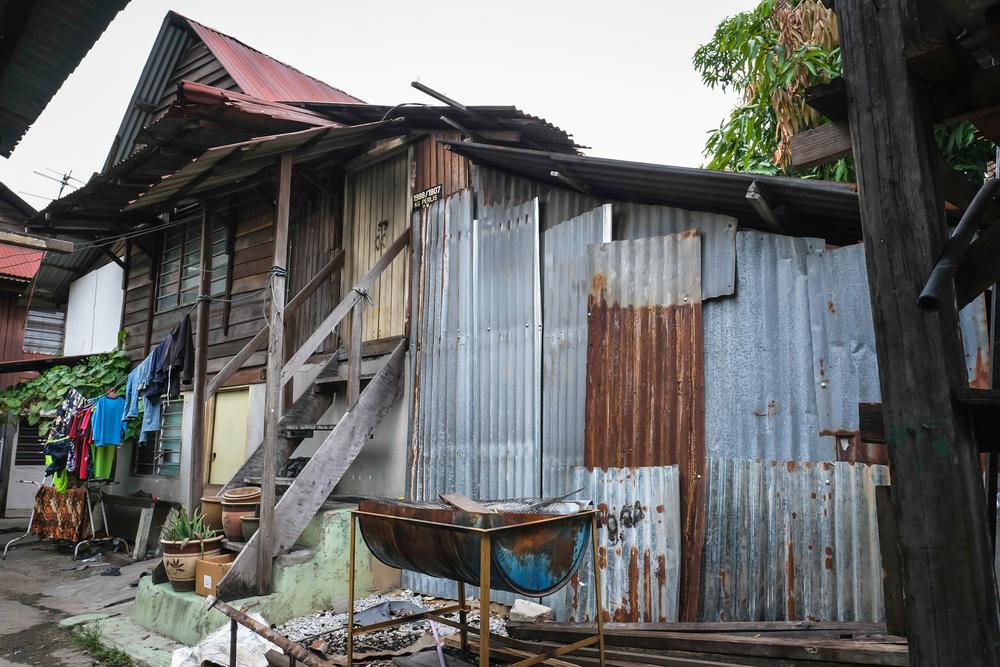
The home of a Rohingya family in Butterworth, Penang. Most Rohingya live in dilapidated wooden houses or flats and are often shunned by locals. Many live with more than one family in some 600 sq. ft houses. May 13, 2022, © Kit Chan
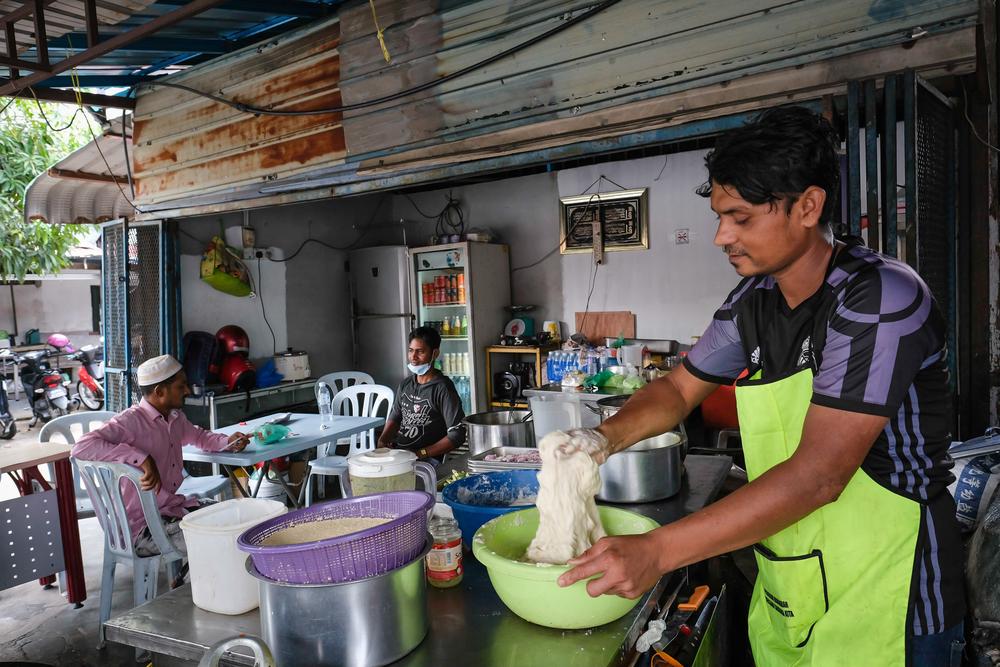
Juhar Suhinamia, 25, mixes the dough to make fried sweet balls in a roadside stall in Bagan Dalam, Penang. Juhar acquired his culinary skills when he started working at a restaurant in Myanmar at the age of eight years old. He fled to Malaysia at the age of 17 and managed to find a job where he could use his skills in cooking. From time to time, the Rohingya community visit Malaysian stalls, but go to Rohingya stalls more frequently to get a taste of home. May 13, 2022, © Kit Chan
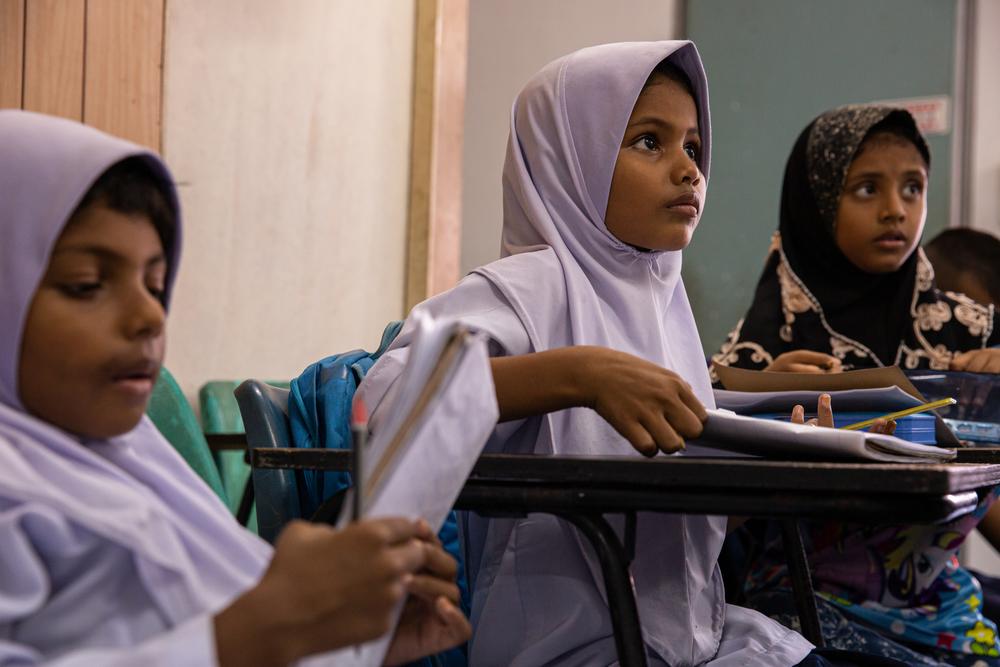
Girls at the Sabina Talim Academy, a school for Rohingya children in Penang, Malaysia. Given that Rohingya and other refugee groups in Malaysia do not have any legal status, and are therefore considered ‘illegal’ immigrants, they are not allowed to attend formal schooling. Here, Rohingya children between 4-16 years old can receive a basic education, mostly in English and Mathematics. The cost for one month of schooling is 50 Malaysian Ringgit (Euro 10). Penang. April 18, 2019, © Arnaud Finistre
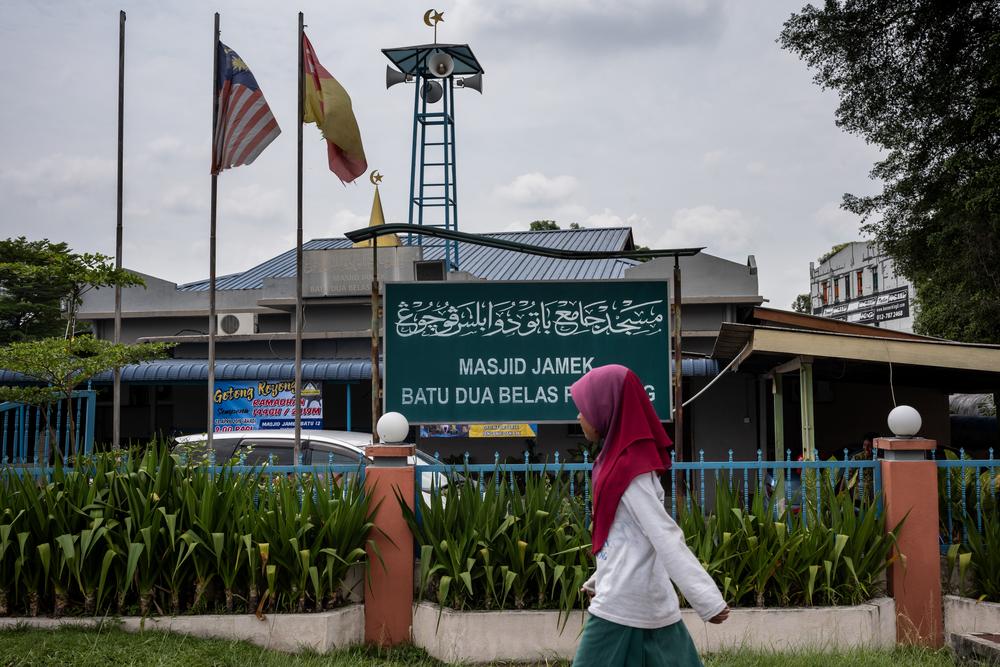
The entrance to the Jamek Mosque in Puchong, near Kuala Lumpur, where around 80 Rohingya children attend the madrassa. Because refugees and asylum seekers do not have any legal status in Malaysia, children are unable to access formal education, so madrassas are often their only chance at an education. April 26, 2019, © Arnaud Finistre
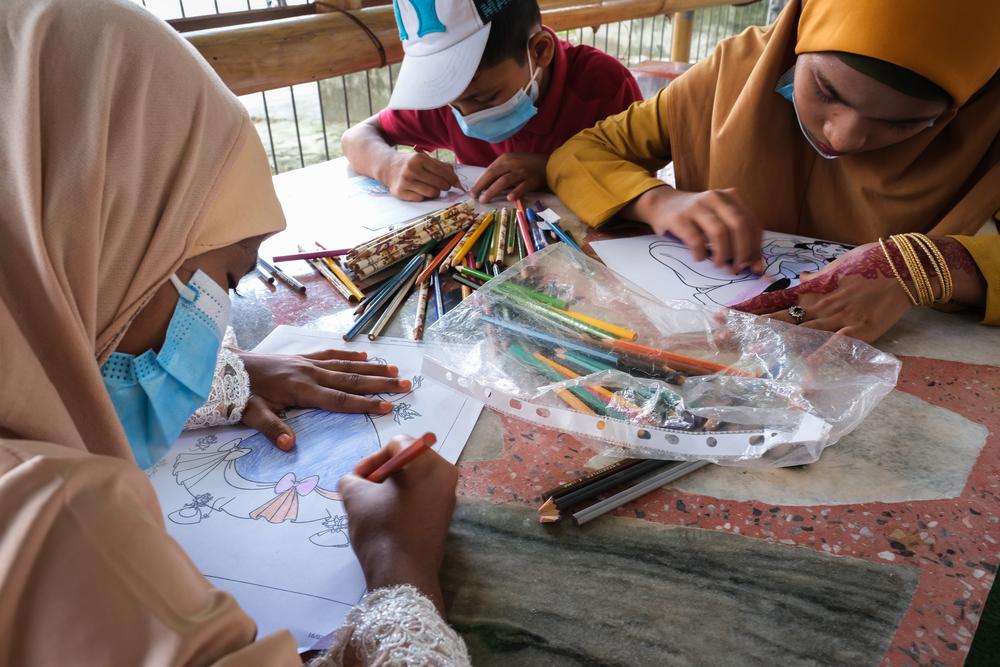
Newly arrived Rohingya children colouring while waiting for their turn to see a Doctors Without Borders / Médecins Sans Frontières (MSF) doctor in a mobile clinic in Penang. They made the journey from Bangladesh and transited through Myanmar and Thailand before reaching Malaysia. They were travelling with their mother to reunite with their father in Malaysia. May 8, 2022, © Kit Chan
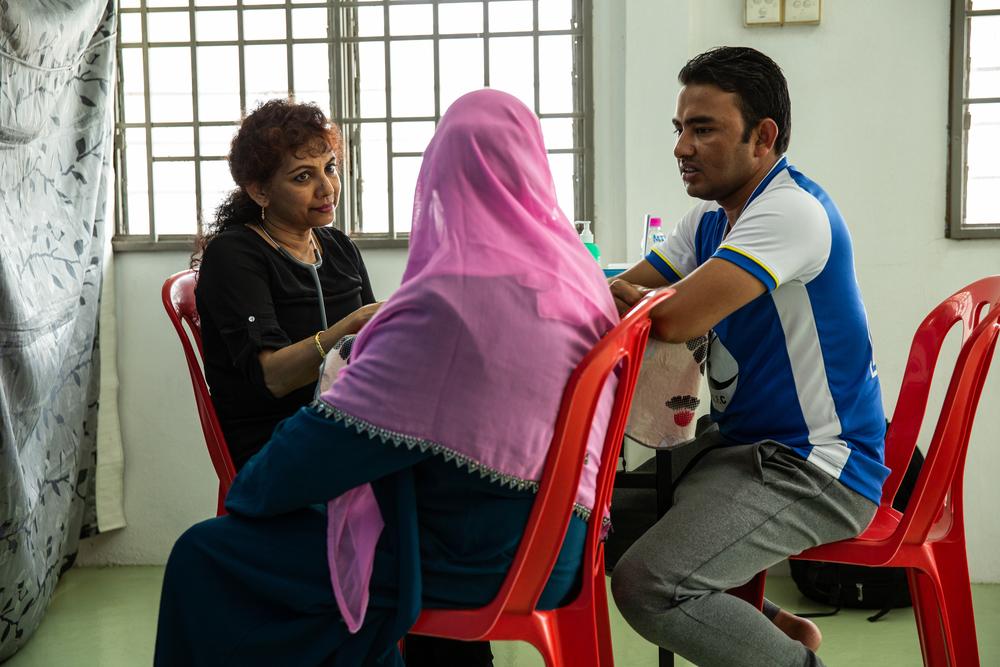
A Rohingya patient has a consultation at Doctors Without Borders’ mobile clinic, accompanied by a translator. Bukit Gudung, Penang. April 21, 2019, © Arnaud Finistre
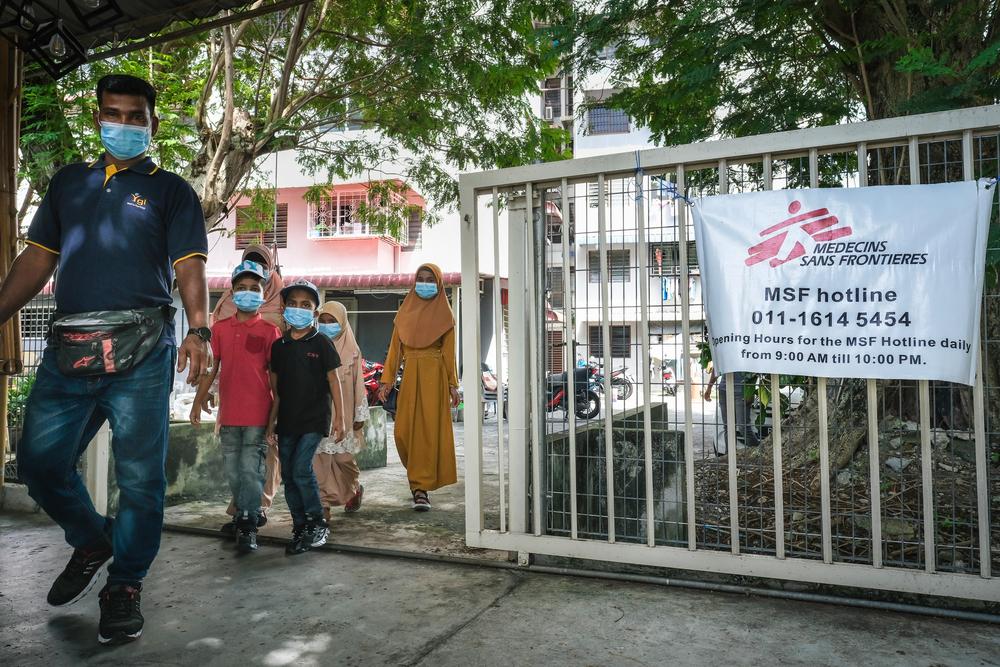
A husband, wife and their four children walking into the Doctors Without Borders’ mobile clinic in Penang, Malaysia. The husband has been in Malaysia for nine years. His wife and children arrived from Bangladesh only a few days ago to reunite with his family. May 8, 2022, © Kit Chan
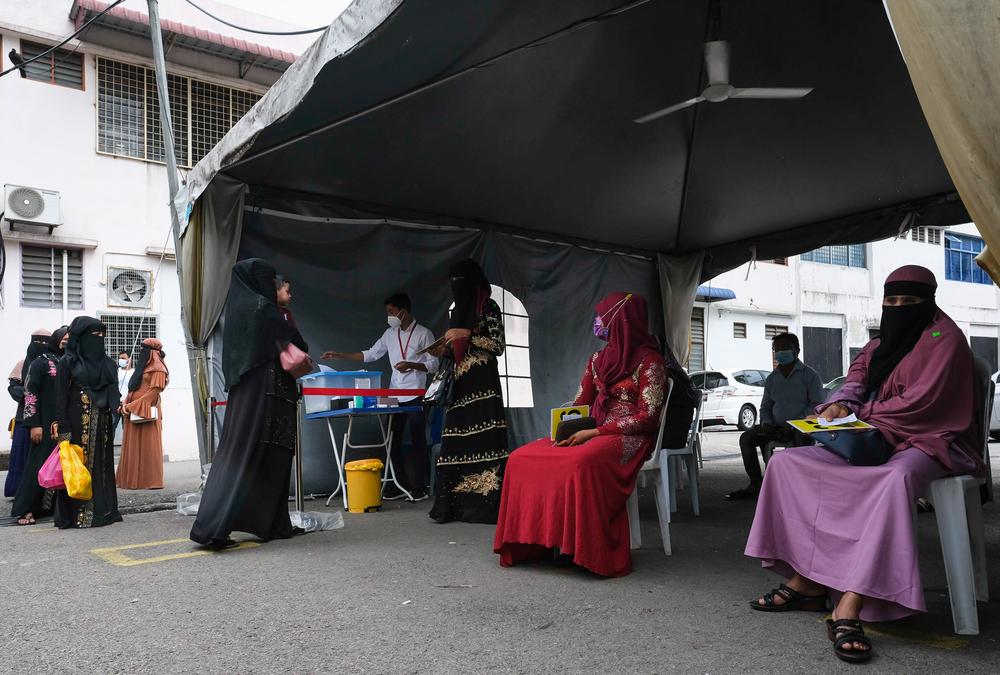
Some patients are queuing up to register their arrival at the Doctors Without Borders’ clinic in Butterworth, Penang, while others are waiting their turn to see the triage nurse. May 9, 2022, © Kit Chan
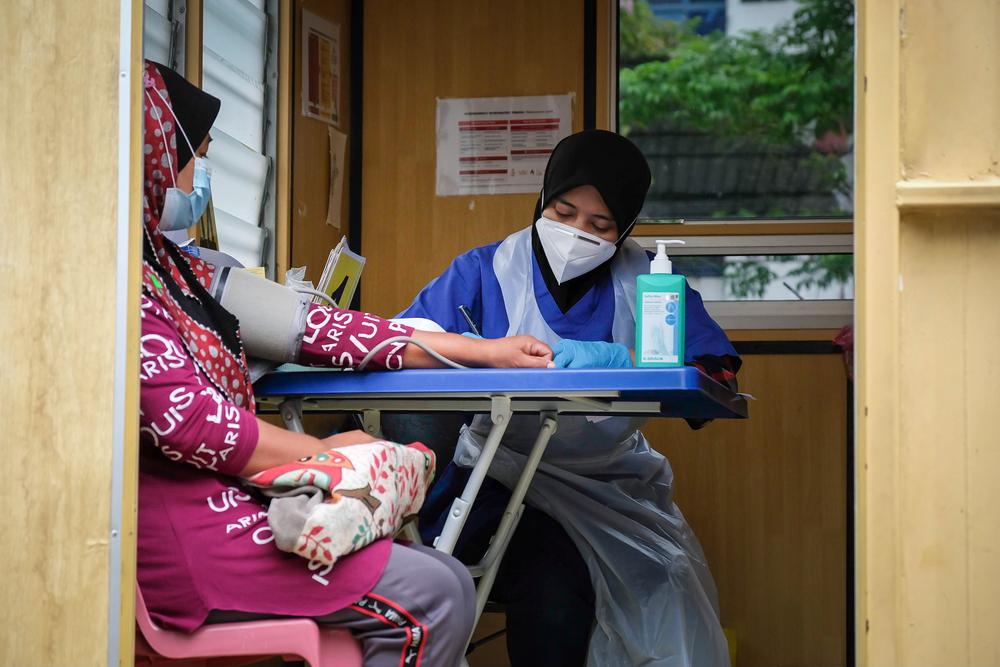
Doctors Without Borders’ triage nurse, Izyan, examines a patient from the Rohingya community in advance of her consultation with a doctor at the Doctors Without Borders’ clinic in Butterworth, Penang. May 9, 2022, © Kit Chan
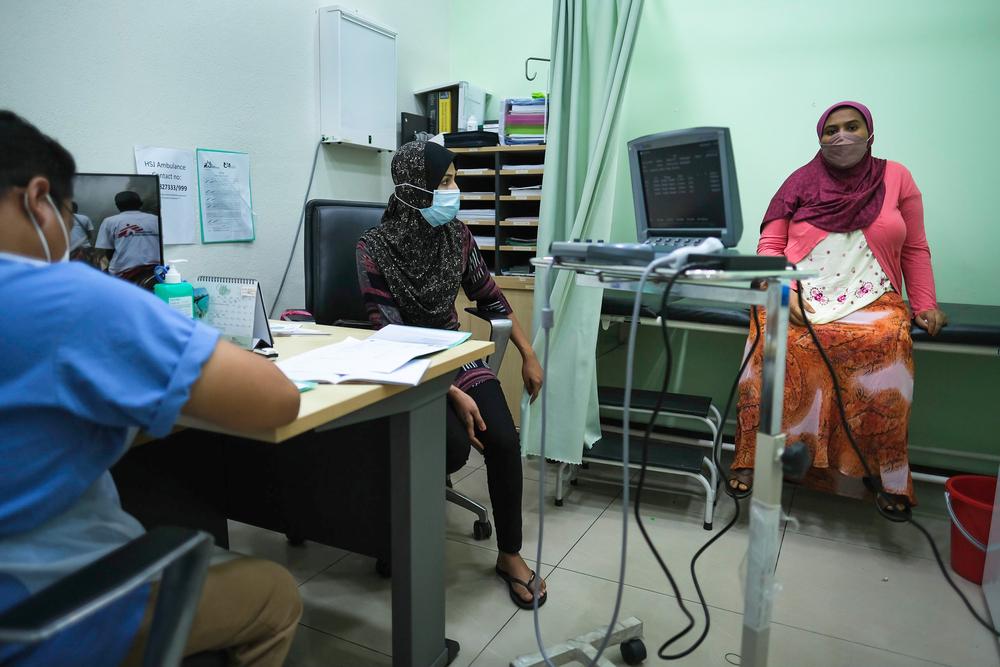
A patient from the Rohingya community in Malaysia explaining her symptoms to the doctor with the help of a Doctors Without Borders’ volunteer, Dilbar, at Doctors Without Borders’ clinic in Butterworth, Penang. May 9, 2022, © Kit Chan
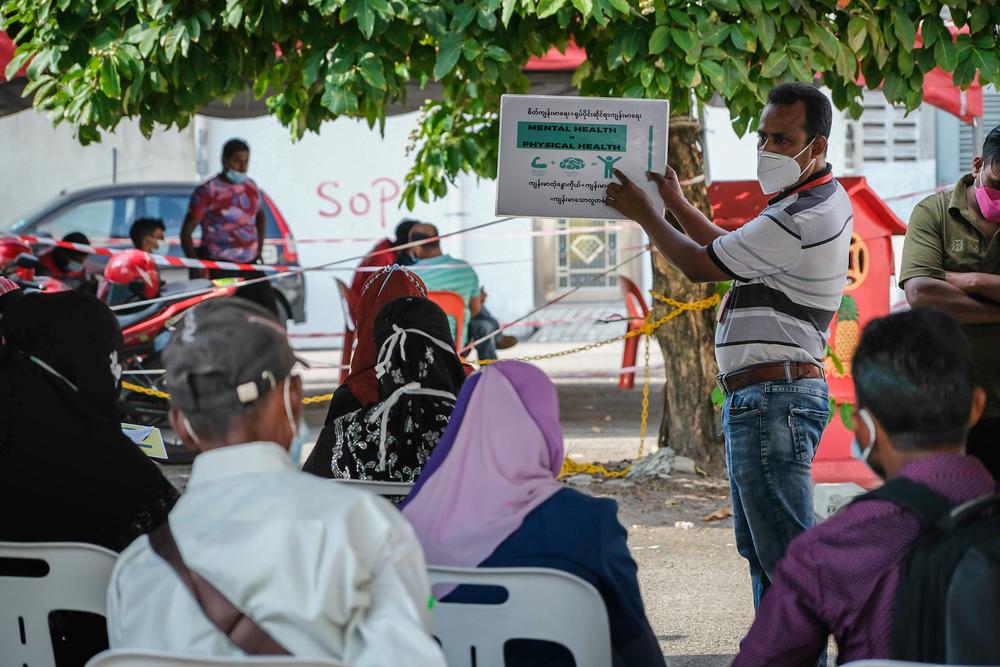
Doctors Without Borders volunteer Hamid Karim providing a mental health awareness session to patients waiting in the triage area at Doctors Without Borders’ clinic in Butterworth, Penang. May 10, 2022, © Kit Chan
